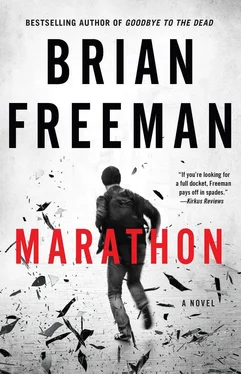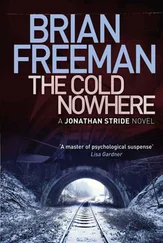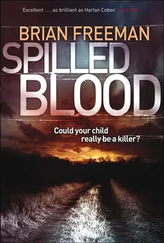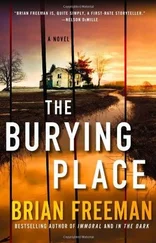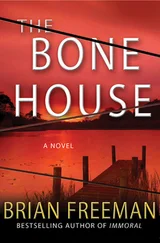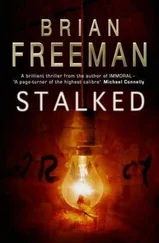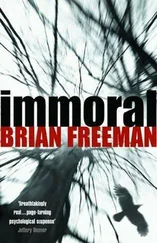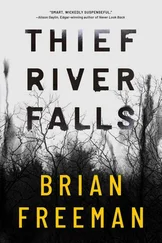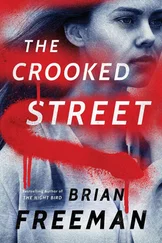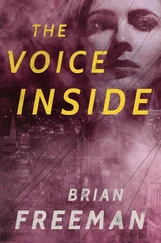“Those girls are wearing bikinis !” Evan shouted with the amazement of a twelve-year-old boy who couldn’t decide if the sight of women in sports bras and short-shorts was interesting or gross.
“They’re not really bikinis,” Michael told his son. “But you do see runners wearing some strange things.”
That was true. They’d seen tutus, leopard skins, superhero costumes. Even a wedding dress. If you were willing to run twenty-six miles in the rain, you could wear whatever you wanted.
Michael and Evan watched the marathon from the sidewalk outside the Electric Fetus music store. He was annoyed to be on the sidelines of the race, not running it. After years as a swimmer, he’d decided on his fortieth birthday to train for the Duluth Marathon, and whenever Michael Malville set his mind to something, he did it with one-hundred-percent intensity. His plan had been to break four hours, and he’d been on track to meet his goal. He’d run a half marathon in Milwaukee in April in one hour, forty-eight minutes, and he was confident that he could meet or exceed that pace in Duluth.
Then, a week earlier, his wife, Alison, had asked him to take a laundry basket down to the basement of their Cloquet home. He’d set one foot wrong on the last step and fractured two metatarsal bones. His marathon dreams were done for the year and, depending on how the bones healed, possibly for good. He’d been angry about it ever since.
Michael was a big man. He was six-foot-one with a broad build. He’d had curly blond hair for most of his life, but when his hair started to thin in his mid-thirties, he’d shaved his head and kept it that way ever since. He wore narrow, rectangular Prada glasses. He was dressed well, in chinos, a burgundy golf shirt, and one tan loafer on his uninjured foot, with a long, open, seersucker trench coat to stave off the rain. Anyone who looked at him could tell he had money, but his life had never been about wealth. He was an adrenaline junkie, and right now, being a marathon spectator rather than a runner was making him restless.
His cell phone rang. It was Alison. “How’s it going up there?” his wife asked.
“Evan loves it,” Michael told her. “One of the runners was dressed like some kind of zombie. That was his favorite.”
“Dad, he was a character from The Walking Dead ,” Evan explained to him impatiently. The boy pointed at his own T-shirt, which showed an actor with a crossbow and the words KILLIN’ IT in red letters. Michael had no idea what the slogan meant, but the shirt apparently had something to do with the television show Evan was obsessed with.
“Are you coming home for lunch?” Alison asked.
“No, we already grabbed hot dogs at Coney Island.”
“How’s the foot?”
“It sucks,” Michael said.
“Well, don’t kill yourself, okay?”
“We’ll only stay a little longer.”
He hung up the phone. Runners flooded past them on the street, and the spectators kept up a loud chorus of cheers, regardless of how much time or how many people had already passed. A woman sitting in a canvas chair shouted over and over, “You’ve got this! Less than two miles to go!” Michael knew her heart was in the right place, but he wanted to tell her that runners hated being reminded of how far they had to go. They all knew, and most of the time they didn’t want to think about it.
“Hey!” a runner shouted from the street. He was big, like Michael, but at least fifteen years younger, with long, wet brown hair and a bushy beard. “Hey, no exceptions, man! No exceptions!”
It took Michael a moment to realize the runner was talking to him. The younger man wore a #noexceptionsbandana tied around his head, and he’d spotted the large red button on Michael’s trench coat that said the same thing.
“No exceptions!” Michael called out, giving the man a thumbs-up. He was always pleased to find other conservatives here, because he didn’t meet too many kindred spirits in the “People’s Republic of Duluth.”
“What does that mean, Dad?” Evan asked, looking up at him. “No exceptions?”
Michael squatted to stare the boy in the eyes. “It means we live in America, and nobody can tell us what to say or what to think. It says so in the Bill of Rights, in the First Amendment to the Constitution.”
“Oh.”
“That’s something to be proud of,” Michael added. “Always remember that.”
“Okay.”
Michael straightened up with difficulty, because his foot was bothering him, and that was the exact moment when a pedestrian pushing quickly along the sidewalk collided hard with his shoulder. Michael lost his balance. Pain, like a lightning bolt, jolted through his leg. He staggered into Evan, and his son stumbled into the street, where a pack of runners had to dodge around him. Michael grabbed Evan’s wrist and yanked the boy back to the safety of the sidewalk.
Furious, he spotted the man who’d struck his shoulder, walking away as if nothing had happened between them. “What the hell!” Michael shouted after him. “Watch where you’re going!”
The man didn’t break his fast stride, but he glanced back and caught Michael’s eye. It lasted a split second, no more. Michael had an impression of someone younger than himself but similarly tall and solid. In that instant, Michael saw one thick eyebrow and one cold, hostile eye in a bronze-skinned face. A waft of musky cologne lingered in Michael’s nose, and he knew it came from the man on the sidewalk. The man wore black jeans and a loose, untucked, button-down shirt.
A navy-blue backpack hung from one of the man’s shoulders. It sank low on his back, as if weighed down by something heavy.
Michael felt the animosity across the distance. He was sure the collision had been deliberate. The angry moment was there, and then it was gone. The crowd swallowed the man with the backpack as he marched toward the Lake Avenue overpass leading to Canal Park. Michael tried to fix the details of the man’s face in his mind, but the image was already growing blurry, like a photograph you weren’t fast enough to snap. The man was just another immigrant on a busy city street.
Michael made sure Evan was okay.
It was 12:17 p.m.
Crowds made Khan nervous. He didn’t like them.
This was a happy crowd, but it didn’t matter. As he came out of the doorway of the Duluth Outdoor Company shop, his senses rebelled at the loud music, the laughter, the clapping, the clanging of bells, and the cheering. He felt an urge to cover his ears to drown out the noise. The squirming closeness of so many bodies made it hard for him to breathe, and they all smelled of rain, sweat, perfume, and tobacco. It overwhelmed him, as if he were fourteen years old again in the streets of Lahore. He trembled in agitation, wanting to run away, wanting to go back to the empty alley behind the shop, but he had work to do.
Behind the silver frames of his glasses, his eyes darted from face to face. It was hard to find one particular man among the hundreds squeezed along the cobblestoned sidewalk. This was where everyone wanted to be. The finish line. It was such an American place: confident, pushy, full of dreams, full of ambition. All the shops were open, hungry for business. Posters lined the street for banks, car dealers, gas stations, and cell phone companies. Runners with flushed faces mingled with their friends, their finisher medals proudly hung around their necks. The beating heart of the marathon was in this place.
Khan thought: If Malik is here, this is where he will be .
His phone rang in the pocket of his black jeans. He dug it out from under his flowered batik shirt and saw that it was Ahdia calling. Even the sight of her name made him smile. His wife, his beautiful wife, who had given him their beautiful son. Khan lived for the two of them.
Читать дальше
